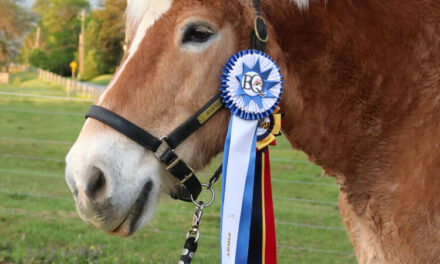Maryland Equine Transition Service, Innovative Equine Welfare Solution Visits The Right Horse Summit by Emily Stakem, Brittney Vallot, and Carrie Hull
(first printed in the August 2019 Equiery)
METS Update
Did you know that Maryland has more horses per square mile than any other state? Did you also know that The Maryland Horse Council (MHC) was the first and still only state horse council to stand up in support of the SAFE Act, which prevents horse slaughter within the U.S., as well as the shipment of horses for slaughter outside of the country.
Maryland leads the nation in supporting our horses and developing innovative ways to address equine welfare issues. In an effort to provide horses in need of transition with safe alternatives, and to prevent them from being neglected or sent to auction, slaughter, the Maryland Equine Transition Service (METS) was formed through a generous three year grant provided by The Right Horse Initiative (RHI), a program funded by The WaterShed Animal Fund, which is dedicated to improving the lives of animals, large and small alike. RHI’s goal, like METS, is to increase the number of successful horse adoptions (and humane, compassionate euthanasia when appropriate) by working collaboratively with like-minded organizations across the country.
METS is a unique program and the first of its kind in the country. Since METS does not have a farm facility (sanctuary or rescue farm) of its own, it does not actually take ownership of the horses it assists. The challenges and expenses such as land, herd and staff management are not a concern, because it is a mobile service with minimal staffing requirements, which eliminates many challenges that other equine assistance programs face.
As a mobile assessment unit, the METS program is uniquely structured to provide as much assistance and feedback to owners as possible so that they can make both safe and responsible decisions for their horses. Once an owner contacts METS and submits an application, Program Director Brittney Vallot visits each horse and performs a behavioral and physical assessment. From there, she discusses with the owner what options she thinks would be best for the horse, whether that be placement assistance or end of life support.
If placement is the best option, a listing is created on the METS website and Facebook page, as well as RHI’s listing site, myrighthorse.org, and other social media and websites as appropriate. METS handles all inquiries about the horses listed on its site. Each of these inquiries requires a stringent reference check. From there, all information about the applicant is passed along to the horse’s owner with transparent feedback from METS so that the owner can make the best decision for his or her horse.
METS works closely with owners in order to ensure that they have the resources they need and feel comfortable enough to make an informed decision on where their horse will be rehomed. The fact that owners reach out to METS means that they want what’s best for their horses and they just need honest guidance, feedback, and advice to make the right decision. METS’ mission is to provide resources and help Maryland horse owners find the best options for their situations, but most importantly to help the horses.
As METS nears twelve full months of equine assessments, it is important to reflect and take stock on the past, present, and future of the program. After RHI pledged their support, METS begin a multi-month program development phase. The program was fully rolled out offering assessments and assistance to owners in August 2018. As of June 30, 2019, METS has completed 57 appointments with owners, totaling 107 horses assessed. This means that METS is encountering many owners looking to place multiple horses, averaging about two horses per owner.
Out of those assessed, METS has helped to place 26 horses into new homes.
After almost a full year in operation, METS has grown a network of equine professionals and enthusiasts to include over 100 individuals such as veterinarians, farriers, transporters, dentists, professional barn owners, trainers, and private owners. METS has also recruited 47 volunteers willing to help with assessments, events, and distribution of METS information and most importantly, fundraising. All of these people are an integral part of the program and owes many of its accomplishments to their help! METS is constantly working on recruiting more of those seeking to help Maryland horses in any way possible.
Right Horse Summit
On May 21, METS Director Brittney Vallot and Program Coordinator Emily Stakem landed in Lexington, Kentucky for the 2019 Right Horse Summit. METS is proud to be a Right Horse Partner and was fortunate to be invited to the first-ever Summit.
The goal of the Summit was to bring together various programs focused on equine welfare in a collaborative event that would encourage and inspire each program to keep improving and growing to enable them to continue helping horses. The two-day Summit kicked off the evening before with a networking reception for all of the attending Partners. This reception was held at the Lexington base of New Vocations Racehorse Adoption Program. METS and the other Partners attending were able to walk around the property and visit some of the horses. New Vocations is devoted to offering off-the-track Thoroughbreds a safe haven, as well as rehabilitation and continued education to help place them in their forever homes. In addition to their Lexington location, New Vocations also has locations in Ohio, Pennsylvania, and New York.
The first day of the Summit was limited to Right Horse Partners. The day had a strong focus on collaboration; one of the phrases printed on the Summit schedule and repeated throughout the two days was “Innovate, Ideate, Collaborate.” It is clear that the equine welfare community works better when using resources effectively and collaboratively. Sometimes those resources aren’t physical, like pasture space or budget for hay. Often those resources are the connections and the knowledge of how to help each other. This is fundamental to the METS methodology, and METS is constantly working on expanding its resources to better help Maryland owners and horses.
It was both refreshing and inspiring to the METS staff to be around so many other programs dedicated to equine welfare and to hear how each individual program works to be successful in its own way. METS was honored to attend this event and excited to see how to apply others’ ideas to its own unique program.
On the Partner day, Brittney sat on a panel titled “Answering The Call: Managed Admissions.” Due to the fact that METS is a mobile service and does not take ownership of the horses, Brittney was able to provide a different take on managed admissions since METS is not limited on how many horses it can accept into the program. All the panelists found common ground with METS, as they also believed in being nonjudgmental and offering as many resources as possible, even though they may not have the space to take a horse into their facilities. If organizations cannot help owners in the ways they need, they give them a contact for someone else who might be able to; it’s all about the common goal of helping the horses.
The second day of the Summit was open to the public. Days End Farm Horse Rescue (DEFHR) also attended the summit and CEO Erin Ochoa gave a presentation about marketing the companion horse. Many of the horses that are most at risk of ending up at auction are the ones that are older or suitable as companions only. While there is certainly a market for companion horses, they are significantly more difficult to place than a rideable horse. Ochoa’s advice that hit closest to home was to make each interaction as personal as possible, no matter if it’s with current owners or with potential adopters. Since adoption is an emotional thing, it’s useful to touch on the emotional connection that people form with horses. If you can connect with a potential adopter, they are more likely to adopt. Ochoa also spoke about the common theme of using resources as effectively as possible. She explained that many trainers would be willing to donate their time in order to make a horse more adoptable. Everyone wants to feel like they are a part of something bigger than themselves, and many horse professionals would be willing to help a rescue if asked. She encouraged everyone to reach out to their local trainers if they needed extra training help, because you never know what the answer will be until you ask.
The METS team flew home with their minds brimming with new ideas. Being able to collaborate and work with The Right Horse has proven to be tremendously positive for METS and meeting the many other Partners helped reinforce that fact. All in all, the Summit was an inspiring and extremely beneficial event and METS is excited for what the future holds as it continues to grow and help even more of Maryland’s horses.











